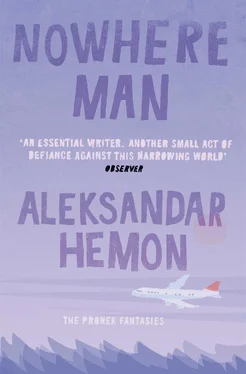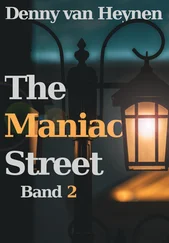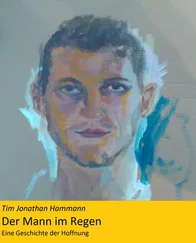Pronek was silent, mulling over a question that would not require too many words. They were waiting at the light on Hollywood. The car in front of them had a bumper sticker reading: IF YOU DON’T LIKE MY DRIVING CALL 1-800-EATSHIT.
“Who is this man?” Pronek asked.
“He’s a character, lemme tell you. He’s Serbian, I believe. Been here for fifteen years or so, married an American girl, had a child, and then split after years of marriage. He’s a runaway daddy, is what he is. Couldn’t find the sonovabitch, wouldn’t show up in court, the lady couldn’t get child support. I gotta get him to accept the court summons, so if he doesn’t show up in court, we can get cops on his ass. Are you all like that over there, sonovabitches?”
He put out his cigarette in the ashtray already teeming with butts, a few of them falling on the floor. Pronek imagined himself snorting up all those ashes and butts: it would be a good way to exhort a confession under torture. He coughed nauseatedly.
“What are you?” Owen asked. “It’s Serbs fighting Muslims over there, right? Are you a Serb or a Muslim?”
“I am complicated,” Pronek said, and retched. The car was like a gas chamber, and Pronek felt an impulse to rise and breathe from the pocket of air just under the roof. “You can say I am the Bosnian.”
“I don’t give a damn myself, as long as you speak the same language. You speak the same language, right? Yugoslavian or something?”
“I guess,” Pronek said.
“Good,” Owen said. “That’s what we need here. That’s why I called you. You get the job done, you get sixty bucks, you’re a happy man.”
Owen lit another cigarette, snapped his Zippo shut, and inhaled solemnly, as if inhaling a thought. The hair island had developed into a vine growing out of his forehead, nearly reaching his eyebrows. He drove past Bryn Mawr, where a crew of crazies was already operating: a man who kept lighting matches over a bunch of cigarettes strewn on the pavement before him, muttering to himself, as if performing a recondite ritual; an old toothless woman in tights with a wet stain spreading between her thighs; a man with thick oversized glasses hollering about Jesus. They drove past the funeral home: a man in a black coat was unlocking the front door and adjusting the welcome mat, yawning all along — there must have been an early death. They stopped at Lawrence, then turned right.
As they were moving westward, Pronek felt the warmth of a sunbeam tickling his neck. The windshield had thick eyebrows of dirt and a few splattered insects under them. As if reading his mind, Owen said:
“Lemme ask you something: what’s the last thing that goes through a fly’s head as it hits the windshield?”
He glanced sideways at Pronek with a mischievous grin, apparently proud of his cleverness. “What is it?” he asked again, and slammed the brakes, honking madly at the car in front.
“I don’t know,” Pronek said. “I should have gone the other way.”
“Went,” Owen said.
“What?”
“Went. You say I should’ve went the other way.” He slammed the brakes again. “But no, that’s not what it is. Think again.”
“I don’t know.”
“It’s the ass. The last thing that goes through a fly’s head as it hits the windshield is its ass.” He started laughing, nudging Pronek, until his guffawing turned into coughing, and then nearly choking. They stopped at the Clark light and he thumped his chest like a gorilla, his vine of hair quivering, his throat convulsing.
Pronek realized that there was an entire world of people he knew nothing about — the early morning people. Their faces had different colors in the morning sunlight. They seemed to be comfortable so early in the morning, even if they were already tired going to work: he could tell they had had their breakfast, their eyes were wide open, their faces developed into alertness — in contrast to Pronek’s daze: the itching eyes, the tense, tired muscles, the crumpled face, the growling stomach, the pus taste in his mouth, and a general thought shortage. The six A.M. people, the people who existed when Owen and his people were sleeping: old twiggy ladies, with a plastic cover over their meticulously puffed-up hair, like wrapped-up gray lettuce heads; old men in nondescript suits, obviously performing their morning-walk ritual; kids in McDonald’s uniforms on their way to the morning shift, already burdened with the midday drowsihead; joggers with white socks stretched to their knees, who seemed to be running in slow motion; sales associates in black stockings, freshly made up, dragging screaming children into a bus; workers unloading crates of pomegranates onto a stuck-up dolly — they all seemed to be involved in something purposeful.
Owen completed his coughing, cleared his throat confidently and asked:
“You still have family there?”
“Where?” Pronek responded, confused by a sudden change in the communication pace.
“Phnom Penh, that’s where! Wherever you’re from, you still have folks there?”
“Yeah, my parents are still there. But they are still alive.”
“Now, who’s trying to kill them? I can never get this right. Are they Muslim?”
“No,” Pronek said. “They are in Sarajevo. Some Serbs try to kill the Muslims in Sarajevo and Bosnia, and also the people who don’t want to kill the Muslims.”
“You probably gonna hate this sonovabitch then.”
“I don’t know yet,” Pronek said. What if, he thought, what if he were dreaming this. What if he were one of those six A.M. people, just about to wake up, slap the snooze button, and linger a few more minutes in bed. Owen hit the brakes again, and Pronek slapped the dashboard, lest he go through the windshield. They were at Western: a Lincoln statue was making a step forward, worried as ever, his head and shoulders dotted with dried pigeon shit. “That sonovabitch lives around here,” Owen announced. He crossed Western, almost running over a chunky businessman who was hugging his briefcase as he scurried across the street.
They parked the car on an empty street with two rows of ochre-brick houses facing each other. Owen adjusted his curl, adhering it to his dome. He was looking in the rearview mirror, his hump breathing on his back, his eyes shrunken because of the fuming cigarette in his mouth. The houses all looked the same, as if they were made in the same lousy factory, but the lawns were different: some were trimmed and orderly like soccer pitch; some had strewn litter, little heaps of dog turd, and wet leaves raked together. Owen pointed at the house that had a FOR SALE sign, like a flag, in front of it.
“What I want you to do,” he said, handing him a stern envelope, “is to go to that door, ring the bell, and when he asks who it is, you talk to him in your monkey language and give him this. He takes it, you leave, I give you sixty bucks, we all happy and free. How’s that?”
“That is fine,” Pronek said, and wiped his sweaty palms against his pants. He considered getting out of the car, passing the house, and running away — it would take him forty minutes to walk back to his place.
“You all right?” Owen asked. “Piece of cake, just do it.”
“What is his name?” Pronek asked.
“It’s Branko something. Here, you can read it.” He pointed at the envelope.
Pronek read: “Brdjanin. It means the mountain man.”
“Whatever,” Owen said, and excavated a gun from under his armpit — two black, perpendicular, steely rectangles, the nozzle eye glancing at Pronek. He looked at it as if he hadn’t seen it for a while and offered it to Pronek: “You want it?”
“No, thanks,” Pronek said. He wondered what would be the last thing going through his head.
“Nah, you probably don’t need it,” Owen said. “I’ll be right here, caring about you.”
Читать дальше












